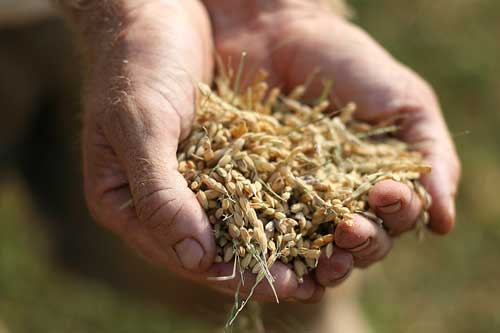Edible Earthscapes Rice Production
go.ncsu.edu/readext?170376
en Español / em Português
El inglés es el idioma de control de esta página. En la medida en que haya algún conflicto entre la traducción al inglés y la traducción, el inglés prevalece.
Al hacer clic en el enlace de traducción se activa un servicio de traducción gratuito para convertir la página al español. Al igual que con cualquier traducción por Internet, la conversión no es sensible al contexto y puede que no traduzca el texto en su significado original. NC State Extension no garantiza la exactitud del texto traducido. Por favor, tenga en cuenta que algunas aplicaciones y/o servicios pueden no funcionar como se espera cuando se traducen.
Português
Inglês é o idioma de controle desta página. Na medida que haja algum conflito entre o texto original em Inglês e a tradução, o Inglês prevalece.
Ao clicar no link de tradução, um serviço gratuito de tradução será ativado para converter a página para o Português. Como em qualquer tradução pela internet, a conversão não é sensivel ao contexto e pode não ocorrer a tradução para o significado orginal. O serviço de Extensão da Carolina do Norte (NC State Extension) não garante a exatidão do texto traduzido. Por favor, observe que algumas funções ou serviços podem não funcionar como esperado após a tradução.
English
English is the controlling language of this page. To the extent there is any conflict between the English text and the translation, English controls.
Clicking on the translation link activates a free translation service to convert the page to Spanish. As with any Internet translation, the conversion is not context-sensitive and may not translate the text to its original meaning. NC State Extension does not guarantee the accuracy of the translated text. Please note that some applications and/or services may not function as expected when translated.
Collapse ▲Photos by Debbie Roos, Agricultural Extension Agent.

Farmers Jason and Haruka Oatis grow a wide variety of crops on their Moncure farm, including vegetables, herbs and cut flowers. Greenhouse crops include tomatoes, cucumbers, turmeric, Thai ginger, coffee, and more. Field-grown crops include the usual vegetables in addition to Asian varieties like molokeiya, shiso, gobo, Japanese cucumbers, Japanese pole beans, Japanese eggplants and Malabar spinach. Jason and Haruka operate a CSA and sell at the Midtown Farmers’ Market in Raleigh and the Western Wake Farmers’ Market in Cary.
Jason and Haruka are pioneers in the production of upland rice in the Piedmont region. 2010 was their second year of production (they grew a small amount in 2009). They grow a premium short grain brown sushi rice called ‘Koshihikari’. The rice was grown with natural fertilizers, no pesticides, and no intensive flooding. The rice was seeded in late May, and the paddies were flooded for the first 10 days only. The crop was harvested by hand in late September, bundled into shocks, and allowed to dry for at least one week. The rice was threshed to separate the rice grains from the stalks in a combine owned by Bobby Tucker of Okfuskee Farm. The final step was to hull the rice using a hulling machine imported from Japan.
A RAFI Producer Grant helped fund equipment and labor for this rice production project. The Oatises were inspired by the book One Straw Revolution by Masanobu Fukuoka.
Visit the Edible Earthscapes website.
Photos of Rice Production at Edible Earthscapes:
Crop Mob Builds Rice Paddies at Edible Earthscapes: March 2010
Edible Earthscapes Farmers Visit Hmong Rice Farms: August 2010
Edible Earthscapes Farm Show and Tell: August 2010
Rice Harvest at Edible Earthscapes: September 2010
Edible Earthscapes Rice Sale: October 2010


